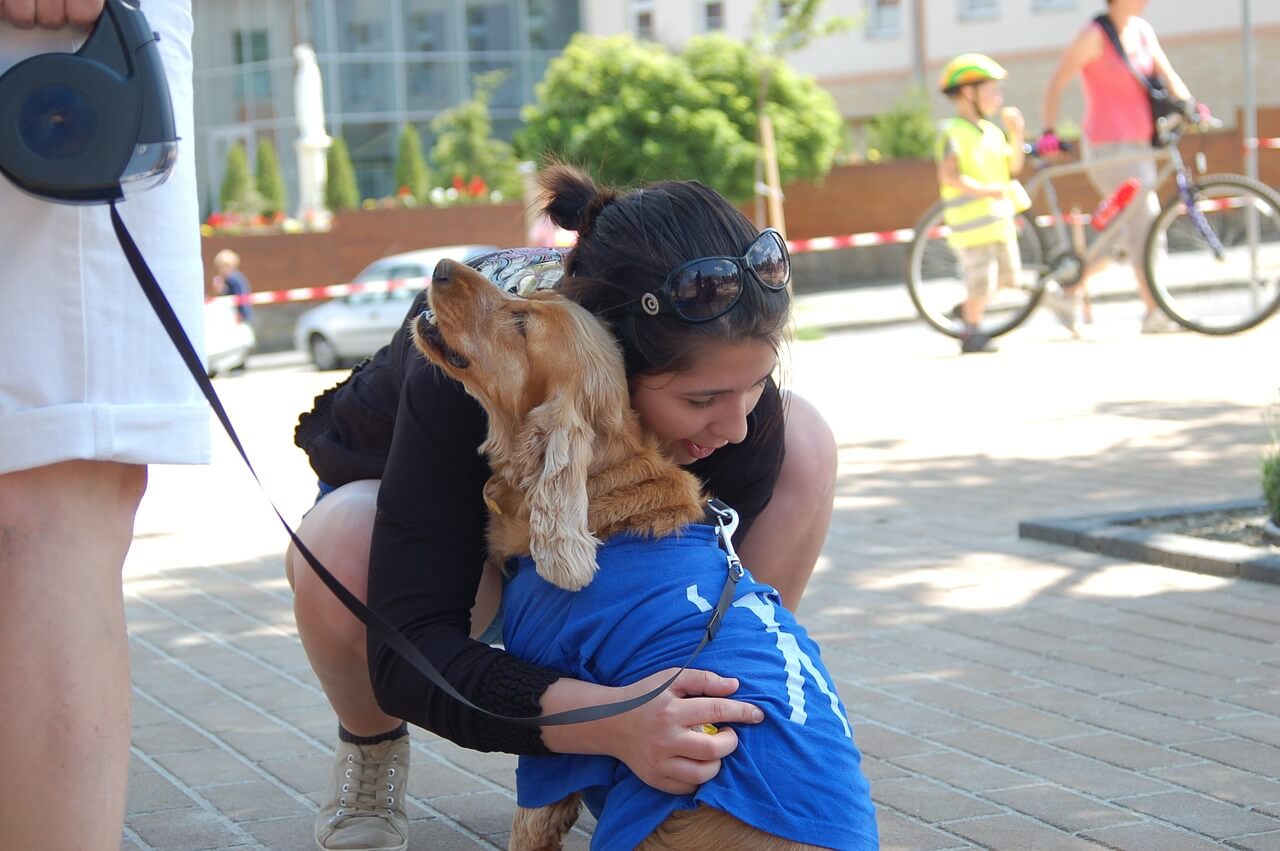2019-09-18

Service dogs are regarded as invaluable assistants and loyal partners for people with disabilities. They are both affectionate pets and considerate assistants, but they have to adhere to special rules and requirements that distinguish them from household dogs. For someone who intends to have a service dog, it is important to learn all about these dogs. This post will attempt to summarize some facts about service dogs in terms of their definition, types, legal rights, requirements, and suitable owners.
In this article:
1. What is a service animal defined by ADA?
2. Who is qualified to get a service dog?
4. Where are the service dogs allowed to go?
4.1. The Americans with Disabilities Act (ADA)
4.2. Fair Housing Amendments Act (FHAA)
4.3. Air Carrier Access Act (ACAA)
5. Housing and Public Access Requirements
5.2. Public Access Requirement
What is a service animal defined by ADA?
Generally, service animals are defined as dogs that are individually trained to perform tasks for people with disabilities in accordance with the Americans with Disabilities Act (ADA). Although other species like miniature horses may make great service animals, only service dogs are currently covered by the ADA.
The law emphasizes that service dogs should undergo rigorous training and do at least one task that can specifically alleviate the symptoms of the disability. For instance, service dogs for the blind should steer clear of obstacles for their handler and lead them across the street. The ultimate goal of service dogs is to improve the health and well-being of the handler.
Who is qualified to get a service dog?
Does anyone with a disability be entitled to a service dog? No, according to the ADA, the person must have a disability above a certain level that the ADA classifies as “disability”. Both physical and mental impairment that substantially limits the activities of one’s own life are included in the category of “disability”. This means that people who have a record of impairment but currently have no disability also qualify as disabled people.
Here are examples of physical or mental disabilities defined by the ADA:
● AIDS, and its symptoms
● Alcoholism
● Asthma
● Autism
● Blindness or other visual impairments
● Cancer
● Cerebral palsy
● Depression
● Diabetes
● Epilepsy
● Hearing or speech impairments
● Heart Disease
● Migraine Headaches
● Multiple sclerosis
● Muscular dystrophy
● Orthopedic impairments
● Paralysis
● Thyroid gland disorders
● Tuberculosis
● Loss of body parts
Types of service dogs
Service dogs undergo special training based on the disability of different handlers and directly benefit the handler. Some of these dogs also have their unique name, such as:
● Guide dogs (for the blind)
● Mobility assistance dogs (to pick up dropped items/pull wheelchairs)
● Hearing dogs (for the deaf)
● Seizure alert/response dogs (for epilepsy)
● Diabetics service dogs (for diabetics)
● Psychiatric service dogs (for social anxiety)
● PTSD service dogs
● ADHD service dogs
● Autism service dogs
However, this does not mean that service dogs can only serve one disability. People who have more than one disability are allowed to get a “double-major” service dog or two service dogs for different disabilities.
The size and breed of service dogs are not limited, which means that any purebred dog or pooch can be trained to become a qualified service dog.

Where are the service dogs allowed to go?
Since service dogs are almost always indispensable and vital to the safety of their handler, they should closely them at home or in public areas.
There are three main laws that govern the places where you are allowed to bring your canine helper.
1. The Americans with Disabilities Act (ADA)
ADA is the main law governing service dogs. It states that businesses, non-profit organizations and governments should allow service dogs to accompany people with disabilities in any place that is open to the public. As a rule, business owners and employees are only allowed to ask two questions regarding the service dog.
● "Is the dog a service dog that benefits your disability?"
● "Has your service dog been trained for the job and what kind of tasks does it have?"
With the exception of these points, you can refuse to answer other private questions such as your disability situation. Also, they cannot force you to provide evidence of your service dog, such as case histories and doggy training certificate. In addition, the staffs are prohibited from charging additional fees for the service animal by using the excuse of their “pet rules”. Otherwise, those behaviors are considered discrimination under the ADA.
Public places where service dogs must be admitted include:
● Campus or schools
● Hotels
● Stores
● Restaurants
● Libraries
● Offices
● Parks or beaches
● Hospitals, nursing homes, and other health facilities
However, there are places where it is not recommended to take your service dog with you, such as swimming pools, labs, and food processing industries due to cleanliness issues, and movie theaters due to noise and confined space.
2. Fair Housing Amendments Act (FHAA)
The second federal statutes protecting service dogs is the Fair Housing Amendments Act (FHAA). However, this mainly applies to renters as landlords are required by law to provide adequate accommodation for assistance animals, including service dogs and emotional support animals. Therefore, people with a disability can live with their service dog in a rented house or apartment with “No Pets” policies.
What’s more, the pet rules for normal pets do not apply to service dogs. Landlords are not permitted to charge extra fees, ask for a deposit or request you to fill out a form about your disability situation. However, you could provide evidence of your service dog, such as a letter from your therapist and the service dog certificate.
3. Air Carrier Access Act (ACAA)
This federal law is to protect the rights of people with disabilities when traveling by plane. It applies to two groups of people and their assistance animals: “service animals” for someone with a physical or mental disability and “emotional support animals” for people with emotional or mental impairments. Generally, most airlines only admit service dogs as “service animals”, but some companies, such as Southwest Airlines, officially allow miniature horses as service animals in the cabin.
Note that the ACAA does not put breed and weight restrictions on service dogs or emotional support animals. Airlines also cannot charge any additional pet fees for service animals or emotional support animals, as the normal pet policies do not apply to these animals.
However, apart from the ACAA, the decision as to whether you can travel abroad in the cabin with your service dog might be made according to the pet rules of your destination. It is recommended that you check the regulations of your destination or consult the airline directly.
Regarding Service Dogs in Training (SDiT), the ACAA currently does not cover related rights because SDiT do not yet meet the definition of “Trained Service Animal”. Fortunately, some airlines permit qualified trainers to take their SDiT with them. It is advisable to read the rules and procedures again before booking a ticket.
Read more: Complete Guide To Flying With Your Service Dog

Housing and Public Access Requirements
Service dogs are afforded numerous privileges and rights under the above three laws. They protect service dogs and handlers from discrimination in both housing and public areas. However, there are still a few rules and requirements that every handler and dog should know and follow.
Housing Requirement: A landlord may remove your service dog for destructive or aggressive behavior that endangers the health and safety of other tenants and the building. Although barking is sometimes unavoidable because it is a natural behavior in dogs, most service dogs have been trained to only bark in certain situations such as alerting their handler or seeking help while the handler is unconscious. The best way is to explain it to the landlord, which can solve the complaint, but also to have more than one helper if you suffer from attacks.
Keep your service dog quiet and obedient most of the time. Do not leave any marks or feces in the public area of the building where you live.
Public Access Requirement: It is recommended to keep your service dog leashed, harnessed or tethered as these outfits are a great symbol of service dogs and help you to keep the dog under control. However, if the devices interfere with your dog’s performance of tasks or interfere with your activities, it is okay not to wear them. In this situation, make sure that your dog is under your control by using hints, signs, commands, and so on. Keep in mind that the staff in restaurants or stores may also throw out a service dog that causes chaos and disturbs other customers.
Train your dog to be polite and friendly to others and not to be distracted by food, noise, and other stimuli. If you want to travel with your service helper, you must get it used to staying in a tight place for a few hours before the trip.
Read these posts to better understand the behavioral requirements for service dogs in the public domain:
Six Important Public Access Tests for Service Dogs